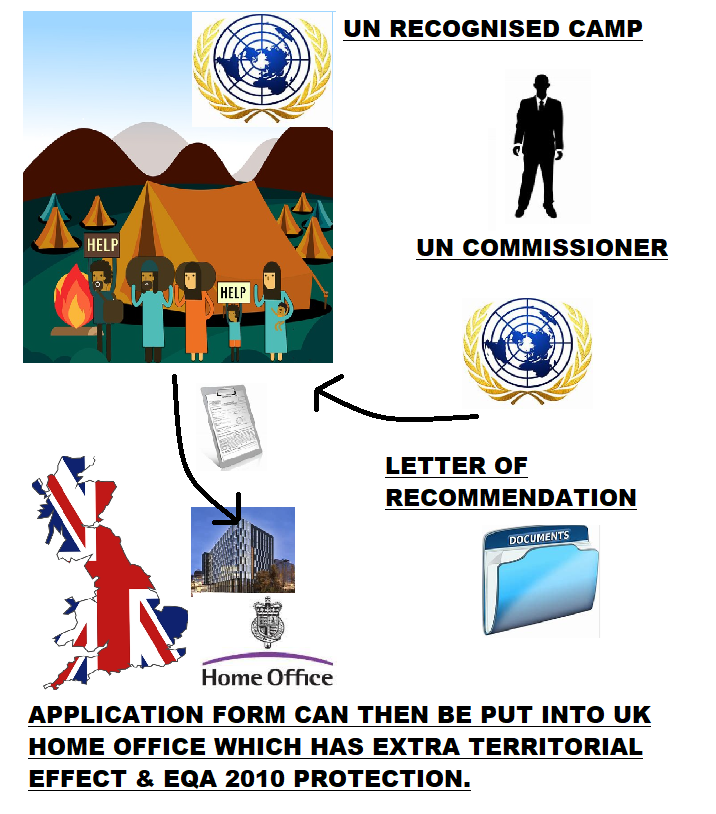Marouf, R (on the application of) v Secretary of State for the Home Department [2023] UKSC 23 (28 June 2023)
Citation:Marouf, R (on the application of) v Secretary of State for the Home Department [2023] UKSC 23 (28 June 2023)
Rule of thumb:Can people in refugee camps around the world make applications online to the UK Home Office for asylum in the UK & rely on the EQA 2010 to make sure that they are treated the same as asylum seekers in the UK in making these application? No, subject to the exception that they can only if (a) they are in a United Nations Relief and Works Agency (“UNRWA”) camp, which the UK recognises, and (b) the United Nations High Commissioner for Refugees (“UNHCR”) gives the asylum a letter affirming that they are a particularly vulnerable person/family who qualifies to make an application.
Background facts:The facts of this case were that Marouf was living in a Palestinian Refugee Camp which was registered by the United Nations Relief and Works Agency (“UNRWA”). Marouf filled in an application form for asylum to the UK Immigration office. The UK Immigration Home Office rejected this application and stated that Marouf did not apply for this.
Parties argued:Marouf argued that the UK had ratified a Treaty stating that they recognised the UN Refugee camp she was in, and she therefore claimed that the way her Application was handled breached the Equality Act 2010 as her application was treated differently than if she had made it in the UK. The Home Office admitted that they did handle this differently than if Marouf had been in the UK, but argued that no people outside the UK could rely on any of the laws in the UK due to the principle of territoriality so the reference to the Equality Act was irrelevant.
Court held:The Court upheld the arguments of the Home Office. They affirmed that Marouf did have a point about extra-territoriality applying to some UN refugee camps registered with UNRAW, with UK recognised & registered refugee camps being an area where extra-territoriality with some very limited matters can apply, however, the Court explained that there is only the right for some people in these camps to apply if the United Nations High Commissioner for Refugees (“UNHCR”) recognises them as particularly ‘vulnerable’ and then refers them to the UK Immigration Office, rather than people in these camps being able to do so of their own volition rather than via the UN Commissioner. The Court therefore upheld the decision to reject Marouf’s immigration application.

Ratio-decidendi:
‘This appeal raises the issue whether the public sector equality duty (“PSED”) imposed by section 149 of the Equality Act 2010 requires public bodies to have due regard to the need to promote the goals listed in that section when exercising their functions in so far as that exercise affects the lives of people living outside the United Kingdom. The Appellant is a woman currently living in Lebanon who wishes to be brought to settle in the United Kingdom. She is a refugee from the conflict in Syria and asserts that she should be treated as eligible to come to the UK under the Vulnerable Persons Resettlement Scheme (“the Resettlement Scheme”) instituted by the Government in 2014. It is accepted by the Secretary of State that she meets the vulnerability criteria for resettlement in the United Kingdom. The Resettlement Scheme is currently implemented by the Secretary of State relying on the United Nations High Commissioner for Refugees (“UNHCR”) to identify and recommend refugees within their remit to be resettled in the UK. The Appellant is not within the remit of the UNHCR because she is a Palestinian refugee. Palestinian refugees in Lebanon, Jordan, Syria, the West Bank and Gaza fall within the remit of a different United Nations organisation, the United Nations Relief and Works Agency for Palestine Refugees in the Near East (“UNRWA”). UNRWA was established in 1949, before the UNHCR. Whereas UNHCR has a specific mandate to assist refugees by local integration in the country where they are living, or by resettlement in a third country, UNRWA has no such mandate. Palestinian refugees are the subject of the exclusive mandate of UNRWA and are therefore outside the remit of UNHCR. It follows that in practice, they cannot take part in the Resettlement Scheme… the extraterritorial effect for which the Appellant contends is a subtle one - it applies to section 149(1)(a) but not to section 149(1)(b) or (c). If Parliament had wanted to achieve that result, it would have made this express in the legislation. Section 29(9) and (10) is not the only place in the EqA 2010 where extraterritoriality is carefully dealt with by the legislature. It is unlikely that Parliament would leave the courts to puzzle out this nuanced construction for themselves, given the very serious implications of that construction for the public bodies in Schedule 19’, Lady Rose at 1-2 & 66.
Warning: This is not professional legal advice. This is not professional legal education advice. Please obtain professional guidance before embarking on any legal course of action. This is just an interpretation of a Judgment by persons of legal insight & varying levels of legal specialism, experience & expertise. Please read the Judgment yourself and form your own interpretation of it with professional assistance.

